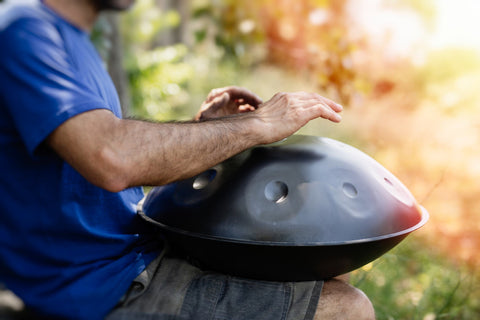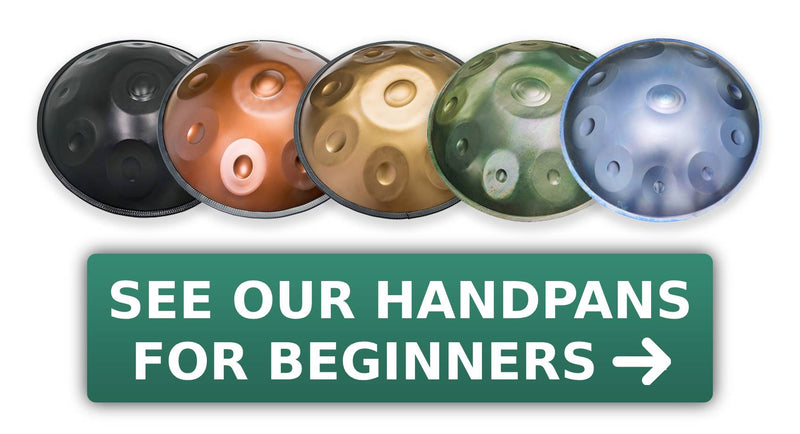Ready to discover the art of preserving your Handpan, an instrument that enchants with its soothing sounds? At ZenaPan, we choose top-quality materials, ensuring its durability. This item guides you in the essential maintenance so that every note of the hang drum conserves its purity. Perfect for beginners, dive into a journey where your musical instrument remain eternally vibrant.
Also read: How to make your own handpan?
Taking care of a nitrided Handpan is a challenge

L'maintenance of a Handpan nitriding represents a real puzzle, mainly due to the diversity of nitriding processes applied by each hang manufacturerThis specificity makes it difficult to apply universal maintenance advice, as the characteristics of each instrument vary significantly.
1. Variability of treatments
Each workshop uses its own nitriding process, adjusting the temperature and duration of exposure to nitrogen. These variations directly influence the porosity and corrosion resistance of the nitrided steel, making each zen drum unique in terms of maintenance needs.
2. General maintenance risks
Follow advice fromgeneric maintenance It can be risky. Some products, such as oils, may not be suitable for your specific Handpan. A poor selection can affect the sound quality of the instrument or accelerate its wear.
3. Manufacturer Consultation
The key to a successful interview lies in communication with the manufacturer of your HandpanBefore any maintenance attempt, it is essential to seek personalized recommendations on products and maintenance practices suitable for your instrument.
In adopting a specific and informed approach to the maintenance of your Nitride handpan, you can preserve its beauty and the quality sound for the years to come.
How to maintain a stainless steel Handpan?
The Stainless steel handpan It is much easier to maintain, as it is much less susceptible to the risk of rust. The fact that it has not undergone a thermochemical nitriding process also prevents it from having more or less significant porosity.
For maintenance, you will need:
- A soft linen,
- From a scrubbing sponge (like the one you use for washing dishes),
- A microfiber cloth or chamois leather,
- D’alcool,
- A protective oil.
Embark on a unique sound adventure by exploring our exclusive collection of Handpans origin on Zenapan. Visit us now and find your perfect drum!
Step 1: Use soft cloth
Start by wiping your instrument with a soft cloth to remove any grease and moisture marks left by your hands.
This step allows you to prepare your musical instrument to receive the protective oil, which can only be applied if your instrument does not yet show any signs of rust. If this is not the case, proceed directly to step 4.
Step 2: Use a scrubbing sponge
When your Handpan It only shows small traces of rust, it's not always necessary to take drastic measures right away.
The first solution to prioritize is using the green side of the sponge you use for washing dishes, the famous scrubbing side.
For those who know about stainless steel balls, which are often used for pots with burnt bottoms, never use them on your instrument. You would damage it permanently.
To properly use the scrubbing side of the sponge, make small circular movements without applying too much pressure. The secret lies in the gentleness. In case of deep rust, you can proceed to step three.
Step 3: use alcohol
It goes without saying that the alcohol to be used is household alcohol of 70° or 90°. To apply it, you soak a soft cloth in alcohol and then apply it to both sides of the hang drum, also paying attention to the joint of the two metal domes.
Alcohol is used because it is less corrosive than water and allows for better removal of surface ions and the removal of already formed rust.
Step 4: apply the protective oil
The purpose of the protective oil is to protect the Handpan metal by forming a film between the air and the metal, in order to prevent the process of oxidation-reduction.
The rouille It is formed by the combination of iron, oxygen, and water. Removing one of these compounds prevents the oxidation of steel.
However, each hang requires an oil recommended by the manufacturer, which complements the characteristics of the steel and the manufacturing process used.
You can apply the oil with a soft cloth, then let it sit for a few minutes.
Step 5: Remove excess with a microfiber cloth or chamois leather
The last step of The maintenance of your Handpan The removal of excess oil. To do this, two techniques are available to you:
- Use a microfiber cloth,
- Use a chamois leather.
In both cases, these types of cloths will allow you to capture the excess oil. The chamois leather has the advantage of making your instrument shine much more than a simple microfiber cloth.
Advice : for greater shine, you can use worn stockings that you will use only to rub the surface of your instrumentThis will ensure it has an incredible shine.
Practical guide for Handpan maintenance
This table provides a detailed roadmap for care and the maintenance of your steel drumBy following these simple yet essential steps, you will not only ensure the longevity of your instrument but also preserve its sound quality.

From the frequency of cleaning to the selection of cleaning products, including storage tips, every aspect is covered to help you take care of your hang drum with confidence and efficiency.
| Maintenance activity | Frequency | Instructions | Recommended products | Precautions |
|---|---|---|---|---|
| Surface cleaning | After each use | Wipe with a soft, dry cloth to remove fingerprints and dust. | Microfiber cloth | Avoid water or chemicals |
| Oil application | Monthly | Apply a thin layer of oil to protect against corrosion. | Coconut oil, baby oil | Apply with moderation |
| Tuning check | Semiannual | Use a tuner app to check and adjust the tuning if necessary. | Digital tuner for Handpan | Do not force the notes during adjustment |
| Storage | Continue | Store in a dry place, at a stable temperature, away from direct sunlight. | Protective cover, Handpan stand | Avoid damp places or sudden temperature changes |
What to remember
To ensure longevity and the sound purity For your nitrided Handpan, it is crucial to follow a routine ofadapted maintenance, specially designed according to the manufacturer's guidelines. The differences in the nitriding process highlight the importance of a tailored approach.
We invite you to share your own tips and to explore more advice on our dedicated blog for passionate about Handpans. Together, let's enrich our practice and understanding of this fascinating instrument of relaxation.
By ordering your handpan at ZenaPan, you will receive a special cloth to clean your instrument.
FAQs
1. How do I clean my handpan without risking damage?
Use a soft cloth slightly dampened with water or a specific product for handpan. Avoid harsh chemicals that could damage the finish and alter the sound.
2. How often should I maintain my handpan?
A light cleaning after each use is recommended to remove fingerprints and dirt. More thorough maintenance, including the application of a protective oil, can be done every 1 to 3 months, depending on usage and climate.
3. What type of oil should I use to protect my handpan?
Prefer oils specifically designed for handpans or natural oils like coconut or linseed oil. They protect against corrosion without obstructing the tones.
4. What should I do if my handpan starts to rust?
If the rust is superficial, gently clean the area with a cloth soaked in oil. For more serious cases, consult a manufacturer or a specialist for professional treatment without damaging the instrument.
5. How do I store my handpan to protect it?
Store it in a dry place, protected from humidity and extreme temperature variations. Use a protective cover or a hard case to avoid shocks and dust.
6. Is it necessary to have my handpan tuned regularly?
A professional tuning may be necessary every few years, depending on usage and care. Drops or improper storage can accelerate the need for retuning. Listen for changes in sound to decide when to consult an expert.




Vincent
Bonjour,
Avec vous une marque d’huile protectrice préconiser pour vos Handpan ?
Merci
Cordialement